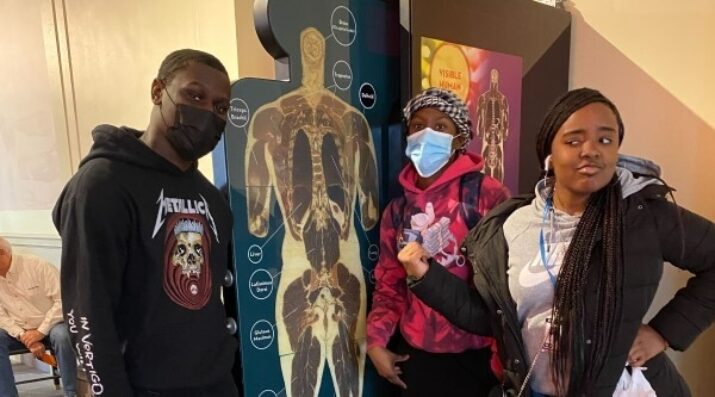Attendance as Performance Assessment
Topics

We’ve all had the experience of truly purposeful, authentic learning and know how valuable it is. Educators are taking the best of what we know about learning, student support, effective instruction, and interpersonal skill-building to completely reimagine schools so that students experience that kind of purposeful learning all day, every day.
Getting to school on time on a regular basis isn’t a precursor to building skills, it is a product of it.
For a long time it had seemed to me that life was about to begin—real life. But there was always some obstacle in the way, something to be gotten through first, some unfinished business, time still to be served, a debt to be paid. Then life would begin. At last it dawned on me that these obstacles were my life.
–Alfred D. Souza
In education, we tend to think of attendance and punctuality as prerequisites. Students need to be in school (and on time) in order to learn what we want them to learn. At the Workshop School, this is often defined as building real-world skills. When students don’t show up or come late, most schools frame it as either a character issue (a student is undisciplined) or a home problem (the student has challenges beyond the purview of the school that make it hard for them to attend). Most interventions focused on chronic absenteeism focus on one or both of these frameworks. Community schools strengthen school-family connections and offer a range of services and supports aimed at reducing out of school barriers to success. Other interventions seek to increase student accountability, suggesting that students skip school because it’s too easy or because there is no cost to missing.
There are grains of truth in both of these perspectives. Teenagers can be a lot of things, and undisciplined is certainly one of them. And home challenges are real. Our students have jobs, care for younger siblings (and in some cases older relatives too), in some cases live in home environments that can be chaotic, and some are dealing with their own mental health issues. In our work, we’re trying a range of things to build support and accountability (so far with mixed results).
But as I have worked more on this challenge, especially with older students, I have increasingly felt like there is something missing from this formulation. Getting to school on time on a regular basis isn’t a precursor to building skills, it is a product of it.
Imagine a high school senior–let’s call him James. James lives 45 minutes away from school and has to take the subway and then transfer to a bus to get there. His mom works a night shift, so James has to get his younger sister up, fed and dressed, and off to school every morning. James is a conscientious student but has no clear idea what he wants to do after he graduates, yet he knows he is expected to make a decision soon and that makes him anxious. That, coupled with his workload and home responsibilities, sometimes overwhelms him. When that happens, he seeks distraction in video games or social media and stays up late and feels less motivated to come to school. As a result, he sleeps in or skips more than he knows he should.
Helping James get back on track is not about getting tough. And while his mother might prefer a different job or schedule, helping her find one is well beyond the purview of most schools. In other words, the basic conditions under which James is attending school are not likely to change. What we need to do is help him to manage those conditions more productively. The easier part of this is project management. What can he do to make his morning routine go smoothly? Where does he need to build in slack time in case a bus is late or his sister isn’t moving as quickly as she should? What time does he need to walk out of the house, and working backward from that, when does he need to wake up?
A more complicated level of solving this problem involves communication and self-advocacy. How can he help his little sister to be more independent? If he needs to drop her at school a little early in order to get to his school on time, how can he work with his mom to communicate that to her school? If his ideal schedule would have him arriving at this school, say, seven minutes late each day, can he work with his teachers or other staff to plan around that so he is not marked late?
Still deeper than that are the reasons for his feelings of overwhelm and how he processes those feelings. It is perfectly normal for James to feel stressed and anxious about his future. How do we help him understand the source of those feelings and to articulate them? How do we help him to think about his future in a way that doesn’t feel quite so high stakes? And when he does feel stressed and anxious, how do we help him learn coping strategies that don’t erode his sleep habits and therefore compound the very problems that are causing him stress to begin with?
Nearly all of us live with a gap of some size between what we know we should be doing and what we actually do. Closing that gap is one of the core tasks of being human, and there is nothing easy (or innate) about it. Why would we expect a 17 year old kid to just know all of this stuff?
Instead of being a measure of a student’s character, what if we thought about punctuality and attendance as a form of performance assessment? It meets many of the criteria to be considered one: it is clear and measurable, tied to a defined set of skills, and has real-world relevance and currency. It also calls on us as educators to help students develop the skills they need rather than simply judging them for not possessing those skills.
Attendance is really important, and there is no one right way to attack it. We should be thinking about how we can help remove barriers, and we should make clear that students have accountability in this process. (As many others have pointed out, we should also be concerned with making school a place where students want to be, or at the very least don’t hate being.) But we should also treat attendance as an opportunity to teach one of the most important skill sets of being an adult: knowing the difference between what happens to you (which you may or may not control) and how you respond to it (which you very much do control). If we do that well, teaching students how to get to school may be just as important as anything they learn once they arrive.
Photo at top courtesy of Workshop School.




